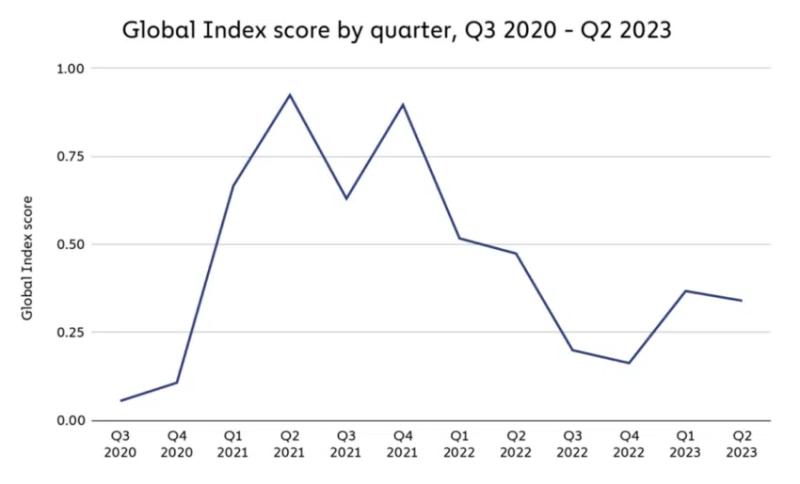
The index, examining crypto usage and adoption across 154 countries, indicates a notable decrease since its 2021 peak. Still, a silver lining emerges in the data as Asia maintains its global lead in crypto adoption.
Asia at the Forefront of Crypto Adoption
India claims the top spot in the Global Crypto Adoption Index. Following closely are Vietnam, the Philippines, Ukraine, and Kenya. It is worth noting that six out of the top ten countries are from Central and Southern Asia and Oceania.
The predominance of Asian nations in these rankings underscores the region’s accelerating embrace of crypto, even as adoption wanes in other parts of the world.
The global decrease in crypto adoption corresponds with the prolonged “crypto winter.” Likewise, the significant price downturn experienced by the crypto market over the past year has had a significant impact.

Global Index Score. Source: Chainalysis
Although there has been a hint of recovery, grassroots adoption still lags behind the all-time highs. The crypto markets reached their pinnacle in November 2021, with subsequent substantial declines — Bitcoin (BTC), for instance, has plummeted by 62% since its all-time high nearly two years prior.
Interestingly, lower-middle-income countries, including prominent ones like India, exhibited a more robust recovery post-crash. These nations are the sole category maintaining a higher adoption rate than 2020.
The report highlights that roughly 40% of the global population resides in these lower-middle-income nations. Their escalating crypto activity might foreshadow a promising trajectory, especially as institutional adoption gathers pace.
India’s Evolving Stance on Crypto Legislation
Given its leadership position in Asia’s crypto industry, India’s policy decisions regarding digital assets are of immense significance. The nation prioritized global crypto regulation during its stint as the G20 president.
As reported by officials from the Indian Finance Ministry, the G20 report, prepared by the International Monetary Fund and the Financial Stability Board, will guide India in finalizing its crypto legislation in the upcoming months.
Although India’s central bank, a key player in the G20 crypto discussions, leans towards prohibiting crypto, there is no indication that the government intends to heed this counsel. The synthesis paper also deemed an outright ban unfeasible.
India put its comprehensive crypto regulation bill on hold in 2022, but officials confirm the country’s adoption of anti-money laundering regulations and taxations. With the nation poised to propel Asian adoption further, the global crypto community eagerly awaits India’s next moves.
In contrast, other regions, like the EU, have already enacted significant legislation. The 27-nation bloc sanctioned the world’s inaugural comprehensive legislation for crypto and its service providers on April 20.

